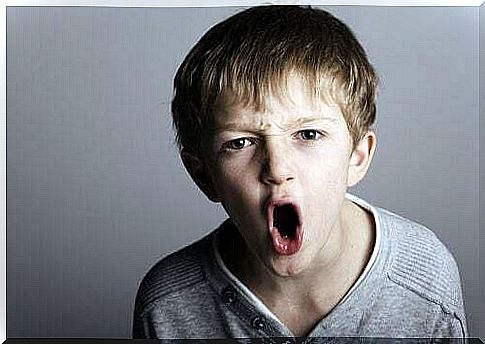The Bully Child Can Turn Into A Violent And Narcissistic Adult

The bossy child knows no bounds and has not been educated to respect and empathy. It poses a danger, because it can become a narcissistic and Machiavellian adult.
Children who bully themselves in school will continue to use bullying in the future to gain power and boost their self-esteem. We are facing a social reality with a greater impact than we think.
Then anyone who says that bullying is a monster with a child’s face is right. The situation worsens mainly because the impact that this type of harmful behavior can have in the future is not always taken into account.
We know that life is by no means easy for victims of bullying. Negative experiences of overwhelm and abuse leave an indelible mark which, in many cases, turns into trauma.
The social consequences are immense. Who will become a bully child tomorrow? What will happen to the teenager who takes pleasure in imposing himself through physical, psychological, verbal bullying and even cyberbullying?
The high school bully, that boy or girl that no one has set limits to when they should have, in the not too distant future could turn into a violent and narcissistic adult, with a personality that is dangerous to our society.
The bullying child represents a failure for society
The figure of the bully child is, in a sense, the essence of our failure as a society. Although the term ‘bullying’ emerged in the 1980s, we know that violence in school and on the streets has actually always existed.
However, today there are more means available to exercise such intimidation. For example, new technologies unfortunately offer more space and in some cases intensify and facilitate aggression by bullies.
When we ask ourselves about the origin of this type of dynamics, based on harassment and violence between peers in educational centers, it is necessary to specify that we are facing a multifactorial reality.
This means that education, parenting models, the normalization of violence, the lack of effective prevention mechanisms and tools for action come into play. But also the addiction of those students who witness bullying on a daily basis and do nothing but turn away and keep quiet.
We could mention many other factors, but we are also interested in another aspect. What should be done with a bully child? The classic strategy of focusing on punishing the offender and supporting the offender has proven ineffective.
We need better strategies and approaches and to raise awareness not only of the victim but also the perpetrator of violence in all its forms.
The bossy child can turn into a violent and narcissistic adult
At school there are many bullying boys and girls who can be framed in the bully’s profile. Some act in groups, others alone, but almost all enjoy the support of a close-knit group and, of course, the silence of those who witness the abuse and do not report it.
Be that as it may, it is a particular individual who holds the power from the start and this is a very specific profile.
In 2015, Drs Effrosyni Mitsopou and Theodoros Giovalias of the University of Athens conducted a study to understand which personality factors may explain bullying in children and adolescents. The study found that:
- The most obvious factor was the lack of empathy, both affective and cognitive. The bully fails to put himself in the victim’s shoes; his only goal is to humiliate and gain power and reinforcement through the daily practice of bullying.
- These children show a noticeable lack of self-esteem, a clear inability to handle negative emotions, as well as a refusal to take responsibility for their own actions.
- These are children and adolescents with very rigid thinking, who only take into account their own personal positions and perspectives.
- Finally, perhaps most worrying is that these children have completely normalized the violence. It is their tool and they use it daily; it is the language they use with them at home and it is also the release valve they use to bring out their frustration.
The bossy child is the narcissistic adult of tomorrow
In 2013, Drs Holly M. Baughman Sylvia Dearing of the Department of Psychology at the University of Western Ontario in Canada discovered something surprising. The bossy child in many cases ends up delineating what is known as the dark triad in adulthood. What does this mean?
The dark triad is a personality model characterized by three dimensions: narcissism, Machiavellianism and psychopathy. The most characteristic traits of a personality defined by the dark triad are:
- Emotional instability.
- Impulsiveness.
- You need to be the center of attention.
- They are skilled and cold manipulators.
- They need to always be in control and exercise power over others.
- The narcissism and lack of empathy that was already visible in childhood and adolescence manifest itself more clearly in adulthood.
- In many cases, they exhibit antisocial behavior.
- Lack of remorse when engaging in abusive or negative behavior towards other people.
Conclusions
Our society often prides itself on being mature, empathetic, inclusive, judicious and balanced. However, it is enough to scratch the surface a little and go deeper to realize that this is not the case at all.
The data at our disposal tells us that bullies are increasing every day, they are getting younger and, what is worse, more aggressive.
At the age of seven, some children mistreat their peers. When they reach adolescence, they learn to be complicit in bullying, to observe, mock, silence and hide the suffering of the victims. By reaching adulthood, these behavior and personality patterns have completely normalized.
Looking to the future is everyone’s responsibility. The bully child is very likely to become an empathetic narcissistic leader who runs a business or takes on a role of power. He could also become our partner or even that neighbor who smiles at us but who mistreats his family within the walls of his home.
Thinking about it, only by being more aware of this reality can we make changes. Because if bullying today has the face of a child, tomorrow it will be an adult who has learned to use violence as a way of life.









